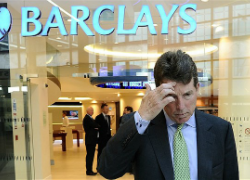In the wake of the London Interbank Offered Rate (LIBOR) scandal that cost Barclays Bank 290 million pounds ($455m) in fines and the bank’s CEO and chairman their jobs, world financial leaders are calling for reforms to the interest rate system that affects $800 trillion worth of financial instruments. Sir Mervyn King, governor of the Bank of England, has written to fellow central bankers that it is “very clear that radical reforms of the LIBOR system are needed.” US Treasury Secretary Timothy Geithner echoed the sentiment and called for a multi-national effort to clean up the system by which the world’s largest banks set the benchmark interests rates at which they lend to each other.

LIBOR is the rate set each day by a panel of eighteen banks that estimate the interest they would have to pay to borrow money from other banks, which in turn affects rates for all borrowers and investors. To set the rate, the panel excludes the top four and the bottom four rate estimates from the eighteen banks and then averages the remaining ten. But what has long been assumed to be an honest system increasingly appears fatally flawed. Very small changes in the rate have the potential to result in differences in daily profits or losses in the millions of dollars for banks, providing the banks a great temptation to cheat. Emerging reports, detailing brazen disregard for the rules, describe a system where lying and rigging is so ingrained as to be outwardly flaunted. Barclays traders reportedly used email and other records to joke and offer favors in exchange for rate manipulations without even an attempt at secrecy.
As details continue to emerge, consensus in the financial world is that several other leading world banks will also be exposed for wrongdoing as well, with at least twenty other banks currently facing investigations or lawsuits. The US Commodity Futures Trading Commission, which brought the original charges against Barclays, claims that Barclays traders “coordinated with and aided and abetted traders at other banks.”
And while the scandal has only recently gained international publicity and brought calls for reform, some industry insiders claim rate manipulations are not a new phenomenon at all. “Fifteen years ago the word was that LIBOR was being rigged. It was one of those well kept secrets, but the regulator was asleep, the Bank of England didn’t care and…[the banks participating were] happy with the reference prices,” says one insider. Indeed, even when officials at the Bank of England and the Federal Reserve Bank of New York learned that banks might have been submitting false rates in 2008 they failed to take action to stop ongoing illegal actions.
Now that the world has caught on, those regulators have woken up, with leaders calling for an overhaul of the entire system as lawsuits pile up and authorities contemplate criminal charges. Some financial experts hope to tie the rate to calculable market transactions rather than continue with the current system that is essentially based on subjective assessments. Governor King hopes to discuss this and other possible fixes with the Economic Consultative Committee in September. In the meantime, banks will scramble to defend against what some estimate may cost the banks tens of billions of dollars in civil suits as corporations, investors, and other affected groups seek to recover losses they suffered as a result of the falsified interest rates.
Thomas Scott is a rising third year law student at the University of Denver and a Publishing Editor on The View From Above.


